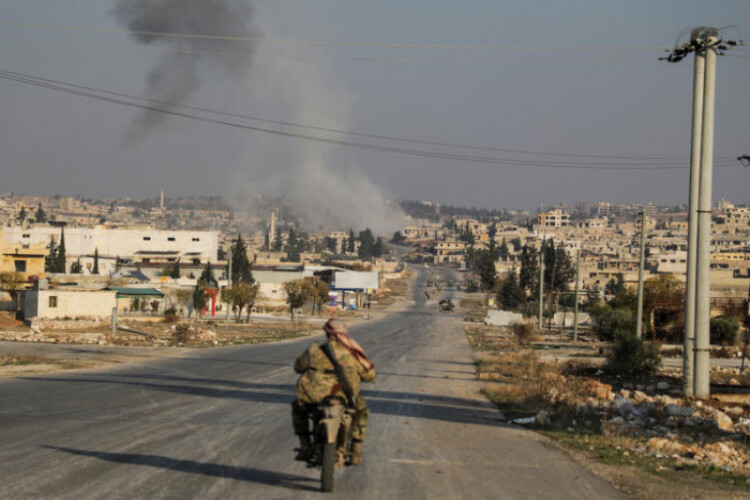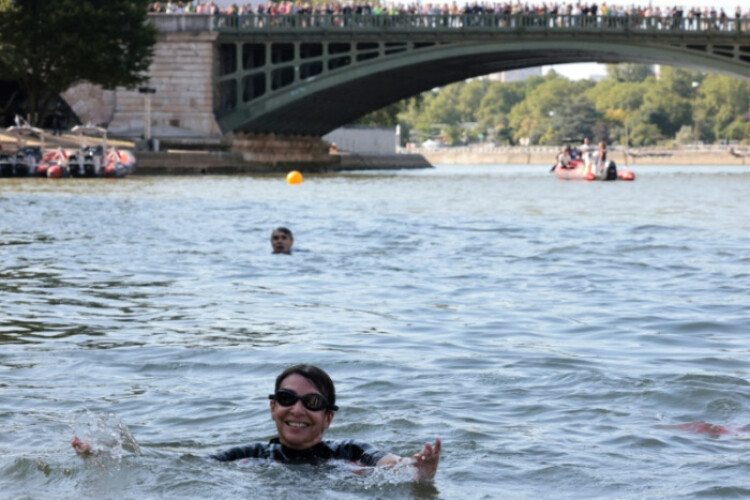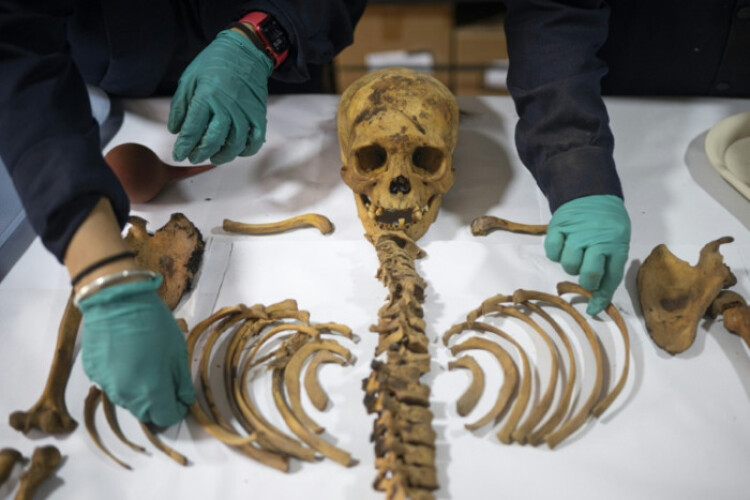
ALEPPO — Syrian rebels breached the major city of Aleppo on Friday, according to the fighters and a war monitor, raising fears that the nation's long-running civil war is reigniting with an intensity not seen in years.
One rebel group, Hayat Tahrir al-Sham, took control of "more than half of Aleppo" within hours Friday without resistance from Syrian government forces, according to the Syrian Observatory for Human Rights, a war monitoring group based in Britain.
Government forces and their Russian allies launched intense airstrikes earlier Friday on opposition-held territory, including 23 attacks on the city of Idlib, according to the observatory. The Russian government confirmed that it was bombing Syrian rebels, but did not specify where.
Anti-government fighters managed Friday to enter five neighbourhoods in western Aleppo after detonating two car bombs targeting government soldiers, according to the rebels and the observatory. The official Syrian news agency, SANA, reported that four people were killed when rebels fired on Aleppo University, in the western part of the city.
The United Nations' (UN) humanitarian agency said that Aleppo's international airport and some of its hospitals were closed, other hospitals were near capacity and security within the city was "rapidly deteriorating."
The rebel offensive launched Wednesday is the most serious challenge to President Bashar Assad's regime in years. And the timing of it has raised questions about whether rebels are trying to take advantage of weakness across an alliance with Iran at the centre, and groups such as Hezbollah in Lebanon and the Syrian regime closely aligned with it.
But rebels said they had been preparing the offensive for months.
Weapons and money have long flowed from Iran across Syria's borders to Hezbollah in Lebanon, part of a so-called "axis of resistance" that includes the Palestinian armed group Hamas in the Gaza Strip. Iran and Hezbollah also provided vital military support to Assad that helped him survive the civil war.
But now, Hezbollah, Hamas and Iran have all been weakened by more than a year of conflict with Israel. A ceasefire this week halted more than 13 months of war between Israel and Hezbollah while Israel's war against Hamas in Gaza continues.
Israel has been bombing Syria for months, targeting Iranian commanders and fighters in the country and weapons shipments transiting through Syria to Hezbollah.
Rebels led by the Islamist militant group Hayat Tahrir al-Sham drive on a motorbike in al-Rashideen, Aleppo province, Syria, on Friday. (Photo: Reuters)
At the same time, Assad's other key military ally, Russia, is bogged down in the war in Ukraine.
The rapid shifts over the past three days "serve as a powerful reminder that the Syrian conflict is far from frozen," said Mohammed Alaa Ghanem, head of policy for the Syrian American Council, a Washington-based advocacy group.
"What remains clear is that these developments expose Assad's deep vulnerabilities and his regime's lack of popular legitimacy," he said.
The Syrian civil war began in 2011, displaced about half of the country's population and sent millions of refugees seeking safety in neighbouring countries including Turkey and Lebanon, and beyond to Europe. It has been largely stagnant for years, but Wednesday, fighters from an array of armed opposition factions launched the surprise offensive against the government in the northwestern province of Aleppo.
The scenes that have unfolded over the past three days — in videos and images shared by the rebels and Syrian media — are eerily reminiscent of the early stages of the civil war. This time around, as before, rebels claimed to have captured a series of towns, neighbourhoods, military bases and weaponry, while issuing calls for government soldiers to defect and join their ranks.
The last major escalation in the civil war was in early 2020, when Russian-backed Syrian forces launched a widespread offensive against rebels in opposition-dominated Idlib province, capturing several towns and cities.
That fighting ended in a ceasefire brokered by Russia and Turkey, which has supported the opposition since the early days of the war.
Three days of fierce clashes have killed more than 250 combatants on both sides, including more than 140 from rebel groups and 87 government soldiers and Iran-backed fighters, according to the observatory.
The rebels posted a map on the Telegram messaging application along with evacuation warnings to civilians in the city of Aleppo, urging people to move to eastern neighbourhoods "for your safety."
Syrian state media claimed that government forces had repelled the rebel advance and inflicted heavy losses on the other side. The rebels did not immediately respond to the claim, which could not be independently confirmed.
The White Helmets, a first-responder organisation based in opposition-held areas of Syria, reported numerous civilians had been killed or injured in the government airstrikes Friday.
In addition to Hayat Tahrir al-Sham, which was once linked with the terror group al-Qaida but publicly broke ties with it years ago, the rebels come from an array of armed opposition factions. Turkish-backed rebel groups are also taking part.
The UN Office for Coordination of Humanitarian Affairs reported that the Aleppo airport was closed, and all flights had been suspended.
Though the Syrian civil war has mostly been frozen for years, clashes along front lines have continued to break out periodically and opposition-held areas are regularly hit by government airstrikes.
Rebels said the goal of their assault is to try to stop airstrikes on opposition-held areas by government forces and their allies.
In a video statement announcing the offensive, Lt Col Hassan Abdulghany, military commander of the opposition's operations room, said the decision to launch the attack was forced on the opposition forces.
"It is an obligation to defend our people and their land," he said. "It has become clear to everyone that the regime militias and their allies, including the Iranian mercenaries, have declared an open war on the Syrian people."
Iran has backed the Syrian government throughout the war, sending advisers and commanders of its powerful Revolutionary Guard force to bases and front lines, along with allied militias with thousands of fighters.
This article originally appeared in The New York Times.
One rebel group, Hayat Tahrir al-Sham, took control of "more than half of Aleppo" within hours Friday without resistance from Syrian government forces, according to the Syrian Observatory for Human Rights, a war monitoring group based in Britain.
Government forces and their Russian allies launched intense airstrikes earlier Friday on opposition-held territory, including 23 attacks on the city of Idlib, according to the observatory. The Russian government confirmed that it was bombing Syrian rebels, but did not specify where.
Anti-government fighters managed Friday to enter five neighbourhoods in western Aleppo after detonating two car bombs targeting government soldiers, according to the rebels and the observatory. The official Syrian news agency, SANA, reported that four people were killed when rebels fired on Aleppo University, in the western part of the city.
The United Nations' (UN) humanitarian agency said that Aleppo's international airport and some of its hospitals were closed, other hospitals were near capacity and security within the city was "rapidly deteriorating."
The rebel offensive launched Wednesday is the most serious challenge to President Bashar Assad's regime in years. And the timing of it has raised questions about whether rebels are trying to take advantage of weakness across an alliance with Iran at the centre, and groups such as Hezbollah in Lebanon and the Syrian regime closely aligned with it.
But rebels said they had been preparing the offensive for months.
Weapons and money have long flowed from Iran across Syria's borders to Hezbollah in Lebanon, part of a so-called "axis of resistance" that includes the Palestinian armed group Hamas in the Gaza Strip. Iran and Hezbollah also provided vital military support to Assad that helped him survive the civil war.
But now, Hezbollah, Hamas and Iran have all been weakened by more than a year of conflict with Israel. A ceasefire this week halted more than 13 months of war between Israel and Hezbollah while Israel's war against Hamas in Gaza continues.
Israel has been bombing Syria for months, targeting Iranian commanders and fighters in the country and weapons shipments transiting through Syria to Hezbollah.
Rebels led by the Islamist militant group Hayat Tahrir al-Sham drive on a motorbike in al-Rashideen, Aleppo province, Syria, on Friday. (Photo: Reuters)
At the same time, Assad's other key military ally, Russia, is bogged down in the war in Ukraine.
The rapid shifts over the past three days "serve as a powerful reminder that the Syrian conflict is far from frozen," said Mohammed Alaa Ghanem, head of policy for the Syrian American Council, a Washington-based advocacy group.
"What remains clear is that these developments expose Assad's deep vulnerabilities and his regime's lack of popular legitimacy," he said.
The Syrian civil war began in 2011, displaced about half of the country's population and sent millions of refugees seeking safety in neighbouring countries including Turkey and Lebanon, and beyond to Europe. It has been largely stagnant for years, but Wednesday, fighters from an array of armed opposition factions launched the surprise offensive against the government in the northwestern province of Aleppo.
The scenes that have unfolded over the past three days — in videos and images shared by the rebels and Syrian media — are eerily reminiscent of the early stages of the civil war. This time around, as before, rebels claimed to have captured a series of towns, neighbourhoods, military bases and weaponry, while issuing calls for government soldiers to defect and join their ranks.
The last major escalation in the civil war was in early 2020, when Russian-backed Syrian forces launched a widespread offensive against rebels in opposition-dominated Idlib province, capturing several towns and cities.
That fighting ended in a ceasefire brokered by Russia and Turkey, which has supported the opposition since the early days of the war.
Three days of fierce clashes have killed more than 250 combatants on both sides, including more than 140 from rebel groups and 87 government soldiers and Iran-backed fighters, according to the observatory.
The rebels posted a map on the Telegram messaging application along with evacuation warnings to civilians in the city of Aleppo, urging people to move to eastern neighbourhoods "for your safety."
Syrian state media claimed that government forces had repelled the rebel advance and inflicted heavy losses on the other side. The rebels did not immediately respond to the claim, which could not be independently confirmed.
The White Helmets, a first-responder organisation based in opposition-held areas of Syria, reported numerous civilians had been killed or injured in the government airstrikes Friday.
In addition to Hayat Tahrir al-Sham, which was once linked with the terror group al-Qaida but publicly broke ties with it years ago, the rebels come from an array of armed opposition factions. Turkish-backed rebel groups are also taking part.
The UN Office for Coordination of Humanitarian Affairs reported that the Aleppo airport was closed, and all flights had been suspended.
Though the Syrian civil war has mostly been frozen for years, clashes along front lines have continued to break out periodically and opposition-held areas are regularly hit by government airstrikes.
Rebels said the goal of their assault is to try to stop airstrikes on opposition-held areas by government forces and their allies.
In a video statement announcing the offensive, Lt Col Hassan Abdulghany, military commander of the opposition's operations room, said the decision to launch the attack was forced on the opposition forces.
"It is an obligation to defend our people and their land," he said. "It has become clear to everyone that the regime militias and their allies, including the Iranian mercenaries, have declared an open war on the Syrian people."
Iran has backed the Syrian government throughout the war, sending advisers and commanders of its powerful Revolutionary Guard force to bases and front lines, along with allied militias with thousands of fighters.
This article originally appeared in The New York Times.










